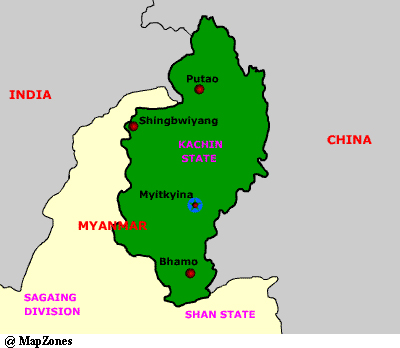The embattled Kachin Independence Organization/Kachin Independence Army (KIO/KIA), unlike other armed groups, is placing political negotiations its first priority and ceasefire second, and having reasonable confidence to do so as it is sharing borders with two countries who don’t feel comfortable with each other, namely, India and China, according to an observer who had lived in the Kachin State and keeps contact with the area.

“They can move their headquarters to the Indian border, anytime Laiza (KIO/KIA HQ on the Chinese border) falls,” he said.
The KIA’s Assistant Secretary General #1 Laphai Sinwa has been assigned to the Indo-Burma border area to oversee the Second Brigade operating there, according to Kachin News Group editor Naw Din.
The situation is markedly different from 1994 when it was forced by Beijing, that wanted a peaceful border to pursue its economic – and strategic – aims in Burma, to conclude a ceasefire pact with Rangoon, Burma’s capital until 2006.
Since 9 June 2011, when the ceasefire was broken, the group has held several rounds of talks with Naypyitaw, the last round on 18-19 January.
The joint statement that was issued yesterday merely says the two sides will continue to hold talks and discuss ways to reduce the intensity of the already 16-month long military conflict.
Meanwhile, many of its allies, including Karen National Union (KNU), Karenni National Progressive Party (KNPP), Chin National Front (CNF) and , not to forget, Restoration Council of Shan State / Shan State Army (RCSS/SSA), are following a different formula: ceasefire first, political negotiations second.
“To reach a ceasefire agreement is easy,” said Lt-Gen Yawdserk, RCSS/SSA leader. “Each organization can do it separately. But none of us are strong enough to conduct successful political negotiations separately. When that time comes, alliances like UNFC (United Nationalities Federal Council) and NDF (National Democratic Front) will not be enough. All of us must join hands together to negotiate.”
According to a Thai geopolitical study, if a chunk of a country’s land is surrounded by neighboring countries, “it is like a big lump of food stuck in your mouth. You can neither swallow it nor spew it out.”
It remains to be seen how long the KIA can hold out alone and how India and China will react to it.



